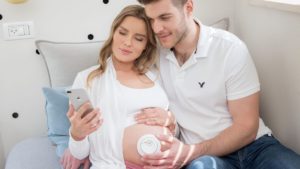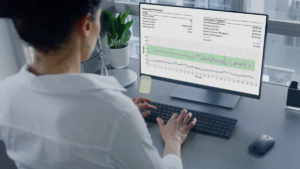Successful clinical study for HeraBEAT device showcases its telehealth application

Medical tech company HeraMED has achieved outstanding results in a clinical study for its HeraBEAT monitoring device (Image: Getty).
Special Report: Medical tech company HeraMED has achieved outstanding results in a clinical study for its HeraBEAT monitoring device for expectant mothers, paving the way for the commercialisation of the technology.
The HeraBEAT foetal and maternal heart rate monitor is the centrepiece of HeraMED’s (ASX:HMD) maternity care software-as-a-service digital platform and uses proprietary technology developed by the company.
Foetal heart rate data obtained with the HeraBEAT device in a home setting for expectant mothers is equivalent to that obtained in an antenatal clinic, a clinical study found.
This means the HeraBEAT monitoring device can be used to remotely monitor and transmit foetal heart rates in telehealth consultations for antenatal care.
Study results show HeraBEAT is accurate and easy to use
The HeraBEAT device was found to have excellent accuracy when compared with a hospital-based Cardiotocography (CTG) (Phillips Avalon) machine, the medical industry’s gold standard for measuring heart rates.
“The results of this study show that the HeraBEAT device is accurate and easy to use by clinicians in the hospital and expectant mothers at home,” Associate Professor Paul Porter, who led the clinical study, said.
Expectant mothers expressed a high rate of satisfaction from using the HeraBEAT device, both in a home setting and at an antenatal clinic, in the study — the first to critically evaluate the technology.
“These results mark the culmination of many years hard work by the HeraMED team to develop a clinically validated foetal and maternal heart rate monitor for pregnant women for use remotely and in telehealth consultations,” HeraMED co-founder and chief executive David Groberman said
Clinical study results to be published in scientific journal
Results for the study that started in July will be published after its research team, led by Associate Professor Porter, has finalised its manuscript for peer review.
The clinical study was undertaken at Perth’s Joondalup health campus in Western Australia, by a team that specialises in innovative technology in obstetrics and paediatrics.
A total of 81 expectant mothers with a range of placental positions, body mass and obstetric histories enrolled in the clinical study designed to evaluate the usability, accuracy and reliability of the HeraBEAT device.
It showed a 100 per cent foetal heart rate detection for all 81 expectant mothers in 126 recordings.
The accuracy rate for the HeraBEAT device in the study was within a mean difference of 0.3 beats per minute.
The overall accuracy rate had a minimal deviation of between -1.5 and 0.9 beats per minute from the medical industry’s benchmark.
HeraMED said the outstanding results of the clinical trial would enable the company to embark on the next phase of development for HeraBEAT and to commercialise the device.
The company is pursuing commercial opportunities in the US market for its technology.
This article was developed in collaboration with HeraMED, a Stockhead advertiser at the time of publishing.
This article does not constitute financial product advice. You should consider obtaining independent advice before making any financial decisions.
Related Topics
UNLOCK INSIGHTS
Discover the untold stories of emerging ASX stocks.
Daily news and expert analysis, it's free to subscribe.
By proceeding, you confirm you understand that we handle personal information in accordance with our Privacy Policy.








